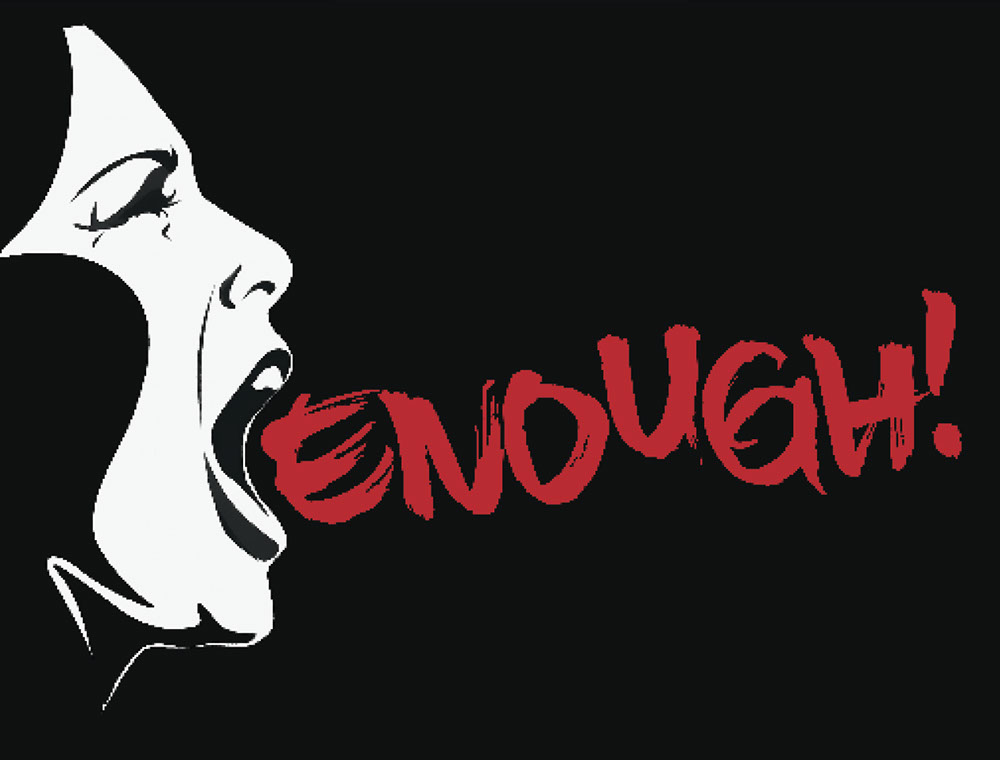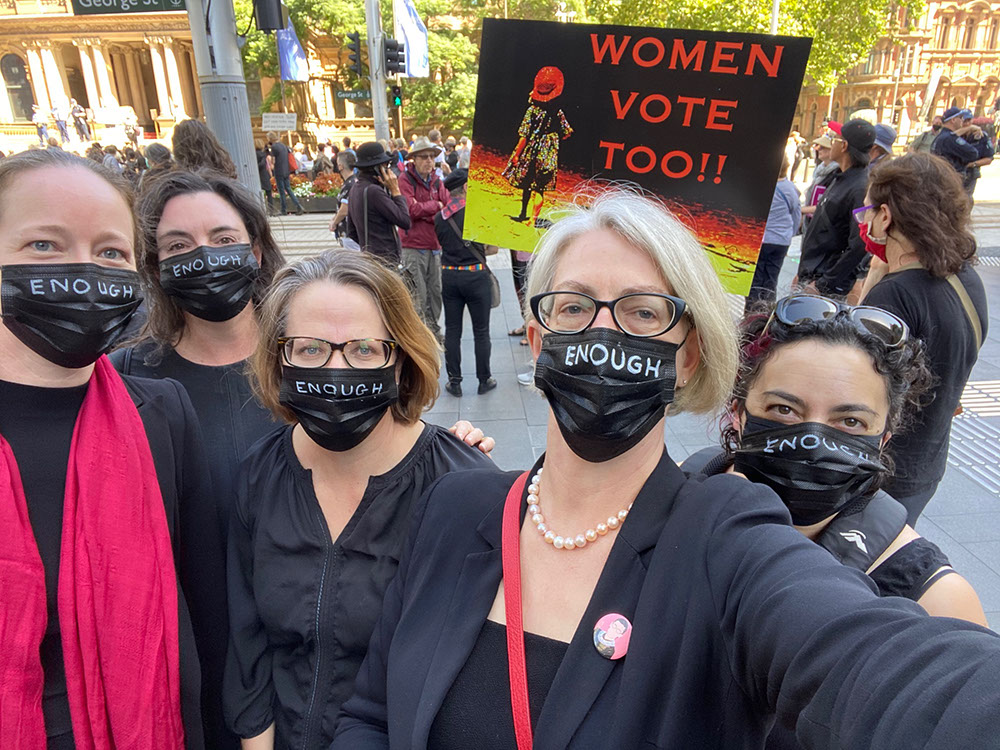Enough of the 'horseplay'

What a month. Some may say, what a year, what a decade, what a century. Women have been fighting for equal rights for far too long, and on 15 March 2021 women across the country, including barristers, took to the streets to say 'Enough is Enough'.
In the last few months, the daily headlines regarding sexual harassment and sexual assault allegations have been boundless. Brittany Higgins, Christian Porter, Chanel Contos, to name a few, accumulating with the recent decision of Council of the New South Wales Bar Association v EFA [2021] NSWCATOD 21, a case involving a complaint about a barrister engaging in sexually inappropriate conduct.

However it was in June 2020 when the legal profession first found itself in the grips of its own #MeTooMovement. The public statement of Chief Justice Kiefel of the High Court of Australia was praised as the exemplar of responses to the sexual harassment allegations against Dyson Heydon.
And so the conversation about the mistreatment of women in the legal profession dominated the headlines, for a while. The issue was hardly new, with calls for respect and equality in the workplace being the catchcry of advocacy groups all over the country for decades, if not more than a century. However, the difference on this occasion was that the silence that had enabled perpetrators had been broken in one of the highest echelons of our profession, and men and women were calling for the sexual harassment of women in the workplace to stop.
But it didn’t stop there.

Rae Mitchell
On 24 February 2021, as the newly formed Executive of the Women Barrister’s Forum (a section of the NSW Bar Association) was being elected, the Federal Government was facing questions about the alleged rape of a parliamentary staffer, Brittany Higgins, said to have been committed by another parliamentary staffer in a minister’s office after work drinks. The government faced questions about what occurred on that night, when the government first knew about the allegations, and once they did know, what they did about it. Amid the questioning, the nation stopped. It stopped to reflect on the question: how is it that a person, a staffer no less, can allegedly be raped in Parliament? It then stopped to reflect on the question which followed: how is it that nothing was done about it?
Then the nation started. The questions, the debate, the fury, that women in 2021 are raped yet still fearful, with good reason, to report it; and fearful, also with good reason, to prosecute the crime.
The alleged rape of Brittany Higgins ignited the flame which had been sitting there for many years, for many women.

L-R: Barristers Sharna Clemmett, Mirren Water, Jackie Charles, Jane Needham and Brenda Tronson attend the March 4 Justice.
But it didn’t stop there.
No less than a week later, a dossier containing a rape allegation against a senior cabinet minister was sent anonymously to the Prime Minister and Ministers Penny Wong and Sarah Hansen-Young. Some days after the dossier became known to the public, the Federal Attorney-General, Christian Porter, identified himself as the alleged perpetrator and delivered a statement before the media denying the allegations.
The complainant of the allegations sadly took her own life in June 2020 and the NSW Police investigation was suspended, and in March this year closed. Since the dossier was delivered to Parliament, there has been no further criminal investigation by the NSW Police.
The allegations brought about a separate debate about whether or not there should be an inquiry into the allegations against Mr Porter, given the criminal investigation had been closed. The debate later extended to a call for an inquiry into whether or not Mr Porter is a fit and proper person to maintain his position as the first law officer of the country.
The term 'rule of law' was broadcast and bandied about by politicians, with the President of the NSW Bar Association releasing a statement to the media about the actual meaning of the rule of law. Necessary.
But it didn’t stop there.
Chanel Contos’ petition for better education in schools about sexual consent went viral. The petition has received over 3500 testimonies and still counting, many of them sexual assault and rape allegations by women, formerly girls from private schools in Sydney, asserting that the alleged offences were committed by then boys from private schools in Sydney.
The petition exposed the high number of allegations of sexual assaults occurring among school students, and has opened up the much-needed conversation about better sexual consent education in schools.
But it didn’t stop there.
While the debates were largely focussed on the mistreatment of women in the nation’s most powerful institution, Parliament House, and the mistreatment of girls in what should be the nation’s most trusted institutions, schools, the issue was brought back into sharp focus for the legal profession, particularly, the NSW Bar, when on 4 March 2021 the NSW Civil and Administrative Tribunal (Tribunal) handed down its decision in the case of Council of the New South Wales Bar Association v EFA [2021] NSWCATOD 21.
The Council of the New South Wales Bar Association (Bar Council) brought the application for disciplinary findings and orders against the barrister. The application was brought under the Legal Profession Uniform Law (NSW). A non-disclosure order was sought pending the determination of the matter by the Bar Council and granted. The non-disclosure order was sought due to the 'sensitive nature of the allegations, particularly to protect the identity of the complainant'.1 In the decision, the barrister is referred to as 'EFA', and the complainant, an assistant clerk, as 'H'.
The complaint by the Bar Council alleged that EFA engaged in sexually inappropriate conduct when attending a barristers’ clerks function in 2017. As found by the Tribunal, the short form of the facts are that at the clerks’ function EFA approached another male barrister, referred to in the decision as 'A', who was sitting at the same table as H. As EFA approached A, the barristers greeted one another by sticking up their middle finger, and once near A, EFA took hold of A’s head and moved it backwards and forwards towards EFA’s crotch. This occurred in front of H. EFA was intoxicated at the time. The interaction between the barristers and the simulation of oral sex was characterised by the Tribunal as 'a ritualised greeting which, in part, parodied oral sex'.2
EFA, who had never met H before, then approached H and lightly pushed her head forward3 and said 'suck my dick'.4 The Tribunal found that EFA did not guide H’s head towards his crotch.5 The Tribunal also found that EFA’s words and actions were not an 'advance' towards H, and that
EFA was not actually inviting H to have oral sex with him. It seemed, rather, from the CCTV footage, that he was extending to her an abridged echo of the greeting he had offered to A. He was including her in the horseplay he had engaged in with A.6
The Tribunal found that EFA’s conduct was inappropriate sexual conduct, but was not an advance of any kind.7 H was offended and humiliated, and the Tribunal found that these feelings were reasonable.8
The Tribunal also found that the pushing of H’s head and the speaking of the words 'suck my dick' by EFA was 'unwelcome conduct of a sexual nature towards H', and that EFA’s conduct was 'poorly judged, vulgar and inappropriate'.9 The Tribunal found that EFA’s conduct did not amount to professional misconduct, but rather amounted to unsatisfactory professional conduct.10 At the time of writing, final submissions were due on penalty and whether, and to what extent, the non-disclosure order should remain.
All this, and four days later, the world came together for International Women’s Day with the theme #ChooseToChallenge.
It is no wonder that on 15 March 2021 the #March4Justice protest took place at Parliament House and at other venues across Australia. Australians, mostly women, rallied in support of gender equality, justice for women and an end to violence against women, underpinned by the message 'Enough is Enough'.
Enough of the disrespectful and sometimes violent treatment of women by men in the workplace and in society generally.
Enough of the lacklustre and ill-thought responses by government and other workplaces when serious matters of sexual harassment and sexual assault are reported.
Enough of the inequality that many women face each day.
The Bar is not immune from these inequalities and mistreatment of women, including sexual harassment and sexual assault. Recent steps to encourage a change in culture at the Bar are to be applauded*, but more needs to be done. EFA’s conduct is a testament to the 'boys' club' culture which clearly continues to exist in some parts of the legal profession. The same culture which continues to infiltrate our schools, our parliaments and our streets. A 'boys club' where 'horseplay' thrives and women are seen as subservient or objectified sexually, or both. A 'boys club' where 'horseplay' thrives and women are denied their right to a safe and inclusive workplace. A 'boys club' where the term 'horseplay' is used to minimise or whitewash conduct of a serious nature. This culture must change. There is no doubt that a majority of barristers at the Bar in the 21st century feel the same way.
Women at the Bar do not want to be part of 'horseplay' or be the recipient of an 'abridged echo' of what can only be described as repulsive, childish and improper behaviour. Women at the Bar are your colleagues, your opponents in court, and members in your chambers. Women at the Bar should not have to demand respect. Women at the Bar are your equal.
Let us never become complacent on this issue; let us never again be silent.
This article is adopted and endorsed by Naomi Sharp SC, Chair of the Women Barristers Forum, and Ingrid King, Co-Vice-Chair of the Women Barristers Forum.
*The NSW Bar Association has published resources for barristers who have experienced sexual harassment, discrimination or workplace bullying. These resources can be found at https://nswbar.asn.au/uploads/pdf-documents/3.7.2020_support_guide_to_combat_sexual_harassment_.pdf.